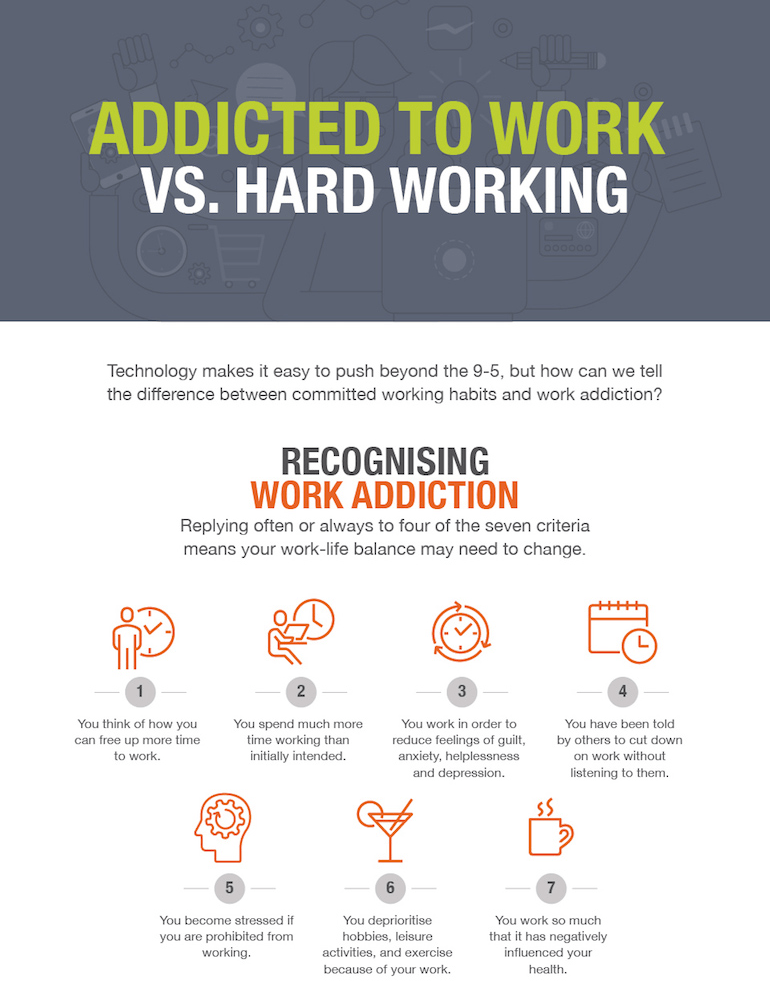4 minutes
Are your employees addicted to their work, or are they just hard workers?
This article is adapted with permission from the Instant Offices blog.
The growth of technology combined with the idea that we need to work harder to achieve more is a popular concept in the modern workplace. According to a study by Techtalk, 44% of U.S. employees have admitted to checking work emails after 11 p.m. Research by Harvard Business Review also shows the average CEO works 62.5 hours a week—around 21.3 hours above the global baseline of 41.2 hours.
With smartphones, computers and apps at our fingertips, we’re able to maintain a constant connection to our work. In theory, these tools should make our workdays shorter and more efficient, but constant distractions and the inability to disconnect can lead to longer work hours and less to show for it. This has made it increasingly easy to push beyond the 9-5, so here are some pointers on how HR professionals and credit union employees can recognize the difference between committed working habits and work addiction.
Signs of Work Addiction
According to the Bergen Work Addiction Scale, replying ‘often’ or ‘always’ to at least four of the following seven criteria may indicate a work addiction:
- You think of how you can free up more time to work.
- You spend much more time working than initially intended.
- You work in order to reduce feelings of guilt, anxiety, helplessness and depression.
- You have been told by others to cut down on work, but you haven’t listened to them.
- You become stressed if you are prohibited from working.
- You de-prioritize hobbies, leisure activities and exercise because of your work.
- You work so much that it has negatively influenced your health.
Impact on Employees
Work-obsessed CEOs run the risk of creating a company culture in which presenteeism reigns. In fact, a study of 29,000 working adults by American Productivity Audit revealed presenteeism costs the U.S. more than $150 billion a year.
As opposed to being absent from work, presenteeism leads to employees having lower productivity at work. They’re also likely to feel judged according to how many hours they sit at their desks rather than the quality of their output. This can lead to burnout, unhappiness and increased health issues, which end up impacting both company and employee negatively in the long run.
Interestingly, the state of New York is doing its part by helping to combat invasive workplace emails from dipping into employee personal time, introducing a bill that gives private workers the right to ignore emails outside of working hours. The Right to Disconnect Bill encourages employees to unplug after work and has been a topic of much discussion around worker’s rights.
Impact on Business Growth
CEOs who work too hard may have trouble delegating effectively or end up micromanaging teams, which can lead to bottlenecks. This behavior also sends the message to employees that they’re not trusted or talented enough to meet expectations, which can cause tension and unhappiness.
How to Regain the Balance
While the dedication to put in extra hours is a valuable trait, it’s important to manage a healthy work/life balance. One of the major differences between a hard worker and a workaholic are the symptoms caused by work addiction: poor health, guilt and increased stress levels. Here are a few ways to combat it:
- Trust your team. For an organizational to grow successfully, it’s important to attract and retain talented employees, delegate effectively and trust them to perform tasks without you. This will free up time for you to focus on strategy and growth.
- Reduce distraction. Shorten meetings, set dedicated working times where people can focus and create a culture of face-to-face interaction rather than relying solely on email. According to a 2018 Udemy report, round 40% of employees believe work distraction could also be drastically reduced with flexible and remote working options.
- Encourage work/life balance. Implement a 40-hour work week for everyone, CEOs included, with an emphasis on results rather than hours spent at a desk.
- Try a digital detox. Set the tone in your organization by normalizing the fact that employees don’t have to adopt an always-on attitude. There are several apps out there that can assist by locking your devices for a period of time.
- Allow mornings to set the precedent for the rest of the day. Whether taking time to exercise, read, meditate or plan for the day, prioritize setting the tone for the hours to come every morning.

Lucinda Pullinger is global head of HR at Instant Offices. Founded in 1999, The Instant Group is a workspace innovation company that rethinks workspace on behalf of its clients injecting flexibility, reducing cost and driving enterprise performance. With offices in London, Newcastle, Berlin, Haifa, Dallas, New York, Miami, San Francisco, Hong Kong, Sydney, Singapore, and Kuala Lumpur, The Instant Group employs 230 experts and has clients in more than 150 countries.





